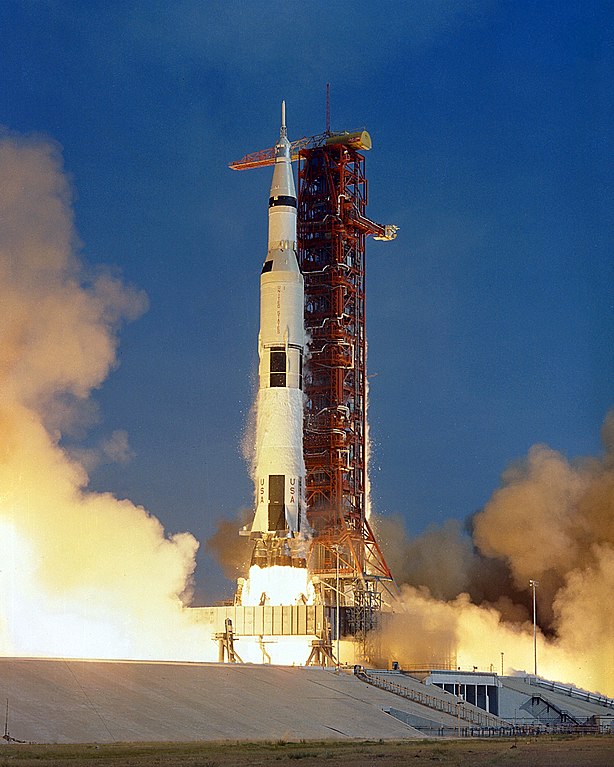
On July 20, 1969, NASA’s Apollo 11 mission’s lunar module Eagle, started on July 16, accomplished the first Moon landing of a manned spacecraft. Mission commander Neil Armstrong and lunar module pilot Edwin “Buzz” Aldrin participated in the landing and spent just over two hours on the surface of the Moon to collect some samples that were brought back to Earth. Once they departed the Moon, the two astronauts rejoined Michael Collins, who remained in orbit in the command module Columbia and returned to Earth on July 24th.
The Apollo 11 mission represented for the USA the culmination of the space program, which was strong stimulated by the Cold War existing with the USSR. The launch of the first Sputnik satellite and Yuri Gagarin’s flight not only were a double defeat but also caused the Americans to fear a communist attack from space. The creation of NASA in 1958 was a first step to catch up and in 1961 the then President John F. Kennedy declared to the Congress the need to land an American on the Moon. In 1962 NASA’s administrator James Webb announced the first details of the Moon mission.
NASA developed the Apollo program to bring its astronauts to the Moon using the Saturn V rocket. Meanwhile the Soviets tried to develop their lunar missions but the tests of their N1 rocket were a failure, kept secret until the fall of the USSR. The Soviets had to were force to attempting a Moon landing with an unmanned lander capable of taking soil samples to bring back to Earth but the mission launched on June 14, 1969 failed due to a rocket problem while the Luna 5 mission launched on July 13 1969 failed because the lander crashed on the Moon’s surface.
The details of the Apollo 11 mission, including the problems encountered during the landing maneuvers, are well known and have been told countless times. The Americans won the space race with the conquest of the Moon and in the following years other Moon missions followed but during the 1970s the international situation started changing for the better, contributing to a decline in interest in these missions after the initial enthusiasm.
The history of the space race is still the subject of discussions and those include the events that led to its end. Certainly the costs of missions such as the Apollo 11 were enormous, more than $180 million of the time for the Saturn V rocket launch, equivalent to today’s more than $900 million, increasingly difficult to justify.

While many efforts by various nations concentrated on Low Earth Erbit with the construction of various space stations, the technological developments inherited from the space race had various impacts. From the development of satellites with various applications to electronics, from recycling systems to applications in different fields in such amounts that an encyclopedia could be written on the subject.
In this decade the situation has changed in various ways, with a new space race that sees the participation of new nations starting with China but India also wants to be a part of it. Another difference is that this time besides a NASA project there are also private entities because Elon Musk’s SpaceX and Jeff Bezos’s Blue Origin have ambitious plans. It’s too early to say if they’ll start building a Moon base in the next decade but it’s been a long time since there were such ambitious projects regarding manned missions. The legacy of the Apollo 11 mission will be important with the accumulated knowledge and the technologies that were developed.


